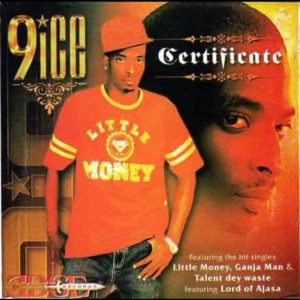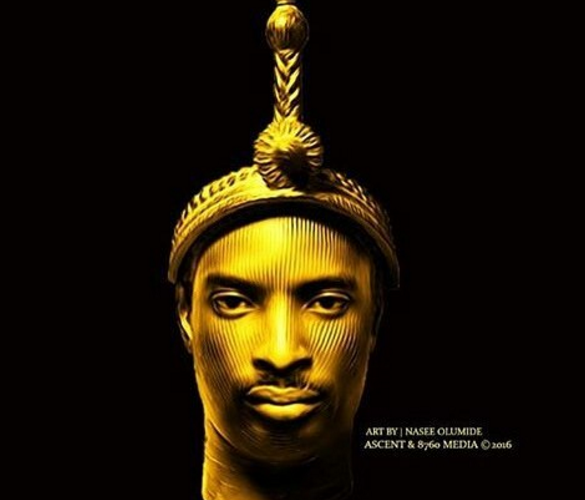Revisiting the impact of 9ice’s debut album “Certificate” 10 years after its release
The reloaded version of 9ice’s debut album Certificate was released 10 years ago today under Ibrahim Okulaja’s Edge Records – it was the official introduction of ‘Akoka’s Top Son’ to the rest of the country and marked a pivotal moment in a very lengthy and successful music career.
However, 9ice’s debut album wasn’t an instant success, the original version of the album was released in 2006 but re-released in 2007 as the singer’s profile grew.
 Even though Certificate was re-released in 2007, it wasn’t until the monster hit “Gongo Aso” came out shortly afterwards that the promising singer rose to the cream of the crop of Nigerian music. 9ice – with the help of his remarkable penmanship and trademark growly voice – was initially known as a proficient hook man for others before he eventually made a name for himself by making big records for himself.
Even though Certificate was re-released in 2007, it wasn’t until the monster hit “Gongo Aso” came out shortly afterwards that the promising singer rose to the cream of the crop of Nigerian music. 9ice – with the help of his remarkable penmanship and trademark growly voice – was initially known as a proficient hook man for others before he eventually made a name for himself by making big records for himself.
His second studio album Gongo Aso was released in 2008 at the height of his fame. That album is widely considered to be a classic and was one of the highest-selling releases in Alaba that year, according to some sources. Certificate never got that kind of recognition or success when it was released, but it did have an impact of its own.
Watch the video for “Little Money”, the first record from 9ice’s debut album that really caught on in the streets:
9ice started his professional career circa 2000, when he actually recorded “Little Money” but he’d have to wait several years before the song would be packaged and promoted in the proper way. 9ice actually stumbled into music, he initially wanted to be a lawyer and got admitted into the university to study Law. Unfortunately, the singer left university in 100 level due to financial reasons and switched his career path permanently to music – and the rest is Nigerian music history.
Before that time, 9ice was part of group called Mysterious Boys with whom he recorded a couple of tracks before going on to form his own, now defunct, group Abinibi. He recorded his first demo titled “Risi De Alagbaja” in 1996 and being a fan of fuji music stalwarts such as Pasuma Wonder and Obesere, 9ice dabbled into that kind of music at first. However, by the time he began working on the Certificate project, the young singer would infuse only some elements of fuji into his own sound, rather than the entire music form.
9ice’s rise and the popularity of his music was fascinating to watch in the years that followed. Early on, he built a reputation as something of a musical sage whose deep understanding of Yoruba language and reverence for the music and culture made him attract both old and young listeners. The singer infused proverbs and wise sayings into his lyrics, and displayed the wisdom of an elder in a young man’s body. The melodies he used were so simple that non-Yoruba speakers too were transfixed and the crack in his voice made his vocal delivery unique – 9ice sounded like no one before him.
The Certificate album was our first taste of 9ice’s talent and it was produced entirely by ID Cabasa – the legendary music producer whom 9ice honored last year by naming his 8th studio album after and declared that all the proceeds of its sales would go to. Working with the multifaceted ID Cabasa, 9ice would find a sound that was contemporary enough to be merged with the mainstream but without losing his strong cultural identity. It was therefore not uncommon for 9ice to (erroneously) be referred to as a ‘hip-hop act’ in those days.
One of the Certificate album’s most popular songs “Talent Dey Waste” featured Lord of Ajasa, the founder of indigenous hip-hop in Nigeria, and it was an early crossover between rap music and traditional Yoruba folk sounds which was a novel idea at the time. Because of the success of the likes of Olamide and Reminisce several years after, some of the experiments that 9ice, Ajasa and ID pulled off back then seem commonplace today, but those 3 were an early bridge between two very discordant sounds and their impact shouldn’t be overlooked.
Watch the video for “Make Them Talk” with 2-Shotz, a seminal record that also bridged hip-hop and Yoruba traditional music, it was placed on both of their albums:
In addition to being musically progressive, “Make Them Talk” also addressed social issues and is a powerful reminder that a lot hasn’t changed in our country so many years after 9ice sang so passionately about the direction of things.
The singer was forthright and honest in his approach however, Certificate didn’t contain only this type of socially-conscious music, 9ice is no Gani Fawehinmi (rest his soul). There was one song in particular that I’m sure the good folks at the National Broadcasting Commission (NBC) wouldn’t have appreciated, it’s called “Ganja Man”.
The song featured 9ice’s label mate at the time Jahbless and extolled the value of weed smoking – Jahbless even called himself and 9ice the ‘2 wise men from Kalakuta’. With its bounce and relatable subject matter “Ganja Man” became a party favorite but the most interesting thing about this song is that neither artist was actually a weed smoker!
Listen to 9ice featuring Jahbless on “Ganja Man” below:
The good times, when boys were boys.
9ice is now a veteran singer, as well as a politician who looks to sweep the polls with his APC broom as much as he aims to sweep music awards. A lot has changed in the Bariga-bred artist’s life since Certificate dropped a decade ago now and if he released this song in 2016/17, 9ice can kiss his political aspirations goodbye.
Adigun has had a long and eventful long music career and he is currently at the beginning stages of another one one in politics but let’s not forget where it all began.
Download/listen to 9ice’s “Certificate” album here


